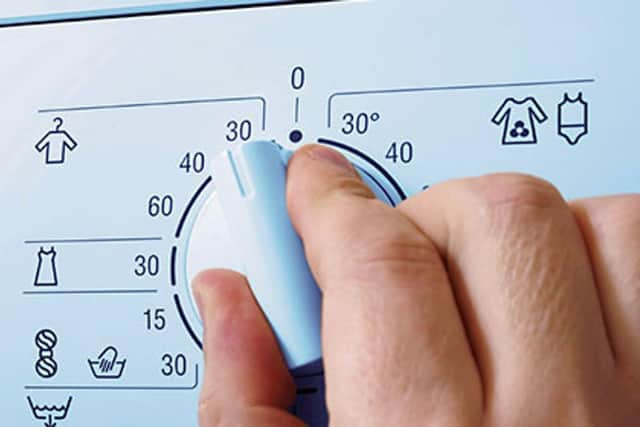Appliance expert shares top tips on how to reduce home energy bills
and live on Freeview channel 276
With energy prices still on the rise, more and more Britons are worrying about energy usage around the home and are looking for ways to save money.
A new study, commissioned by AEG, found that 73% of Britons have become more conscious about wasting energy due to escalating expenses, while 93% are now making a deliberate attempt to reduce their energy bills.
Advertisement
Hide AdAdvertisement
Hide AdAEG surveyed 2,000 Britons to learn about their energy-saving habits and knowledge, and these were the findings.


To lower energy usage, it is recommended to make sure that appliances are operating at their maximum efficiency and receive regular maintenance.
One in five Britons have never defrosted their fridge freezer
The consumer data revealed that one in five Britons (19%) have never defrosted their freezer which could be adding to household electrical consumption and bills. Large amounts of ice build-up can restrict airflow inside the appliance therefore making the fan work harder to keep the temperatures cool. Not only does this increase energy usage, but also decreases the shelf life of freezer food.
Advertisement
Hide AdAdvertisement
Hide AdWith age comes wisdom, as 53% of those aged 55 and over defrost their freezer at least once per year compared to just 24% of those aged 16-34.
Michael Forbes, product specialist, AEG, recommends that users defrost their freezers at least once a year to avoid any excessive ice build-up resulting in the appliance overworking. Despite this recommendation, 40% of Britons leave it longer than a year before taking the icy plunge.
In fact, the AEG’s study also revealed that Britons on average throw away 14% of their weekly food shop due to food going out of date. A quarter (26%) also stated that they always end up throwing out fresh food such as fruit and vegetables because it goes out of date quicker.
Michael Forbes comments: “Placing food in the centre of the fridge shelf helps keep everything tasting fresher for longer and can prolong the lifespan of those often-wasted products.”
Advertisement
Hide AdAdvertisement
Hide AdOver a third of Britons don’t know what temperature their fridge should be
Fridges should be set at the correct temperature to prevent the appliance from overworking– this too will help to reduce energy bills overtime. Previous studies from AEG highlighted that 37% of Brits don’t know what temperature their fridges should be.
Experts at AEG advise the average household fridge should be at a near constant temperature between 0°C and 5°C.
“It’s natural for your fridge temperature to fluctuate a little between these values particularly when being opened and closed a lot. Another contentious reason for your fridge temperature to increase, is if you are to add any warm leftovers inside,” Forbes continues.
Advertisement
Hide AdAdvertisement
Hide Ad67% of Britons also believe that by storing food correctly in the fridge it saves money on household bills. If food is stored correctly, not only does it last longer but it improves a fridges efficiency thereby reducing its electricity consumption.
40% of us are still washing clothes at 40c or more
When it comes to clothes washing habits, many laundry detergents are now suitable for use at 20 degrees to better benefit the environment. Despite this, 40% of us are still washing laundry at 40 degrees and over, with the worst culprits being those aged between 16 and 25.
Although half of Britons (51%) are washing their clothes at 30 degrees, only one-third (33%) of those aged 16-24 have adopted this practice. This increases to 45% for those aged 25-34 and 53% for those ages 35-54. However, those aged 55 and over are making an active effort in keeping their wash cold, as 58% of them are washing their clothes at 30 degrees.
Britons are also breaking the 30-degree rule for towels and bedding with a quarter of us (25%) always washing these at a higher temperature. A further one in five of us (20%) believe that by washing clothes at higher temperature it leaves them cleaner.
Advertisement
Hide AdAdvertisement
Hide AdCooler settings on washing machines are cheaper to run because the cooler the wash, the less energy needed to heat the water. Running a wash on as low as 30 degrees will not only save money but leave clothes feeling equally fresh, all while preserving fabrics for clothes to last longer.
16% of Britons don’t take any measures to maintain their appliances
Although modern-day appliances are built to be durable, proper care and maintenance of appliances will not only will this improve their efficiency, but it will also lengthen their operational lifespan.
It’s recommended that the inside of a washing machine should be wiped clean on weekly basis to avoid residue build-up. The data revealed that two in five Britons (42%) do in fact regularly deep clean their washing machines as well cleaning out their tumble dryer filter.
Advertisement
Hide AdAdvertisement
Hide AdExperts agree that a home oven should be cleaned on average every three months to ensure food quality is kept at its best. Although one of the most important appliances in the home, only a third (36%) are regularly cleaning their ovens.
More alarmingly, 16% of Britons do not take any measures to maintain their appliances despite expert recommendations. Not only could this be adding to household bills, but this could also be shortening the lifespan of millions of appliances.